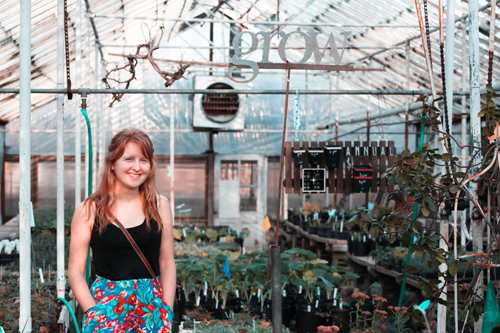By Guy Spriggs
According to Spanish and topical studies major Sammi Meador, it can be hard to use words like environmentalism and sustainability when talking about her personal and academic interests.
“These are hot topics right now,” Meador said, “and a lot of people think these are just wishy-washy terms.”
As she explains, however, sustainability is about far more than buzz words and empty gestures. Environmental studies is also about people.
“People think it’s a liberal white kid thing, that the goal is to be a hippie and to save the animals and all that. But there’s a human side to it. Sustainability really includes every aspect of human society,” she said.
“I’m coming from a place of privilege that affords me the time and resources to ponder these ethical questions,” Meador continued. “I don’t devalue environmental campaigns, but to me sustainability represents a unification of struggles for economic and social justice, including environmental justice.”
These interests make Meador a model student for the College of Arts & Science’s newest program: a bachelor of arts in Environmental and Sustainability Studies (ENS), which will be offered for the first time in the fall of 2013.
>>Visit the Environmental & Sustainability Studies website
She learned about the possibility of an ENS program in her first year at UK, and contacted chemistry professor David Atwood about trying to join on. Since the major was still in the works, however, Meador pursued her interests through an academic track in topical studies.
As a double major, one of the most rewarding things about studying ENS – even before the program was made official – was the sense of freedom and flexibility Meador found in her studies.
“I’ve been able to take classes in gender and women’s studies, sociology, anthropology, geography, political science. They all fit. My senior paper is going to be about environmental topics but it’s bringing in all these other disciplines, which makes it very interesting,” she explained.
Meador believes it is important that ENS offers this same flexibility to new majors in the program.
“There are different tracks in ENS and a diversity of opportunities whether you want to pursue policy or conservation. They fit the pillars of sustainability: economy, environment, and society. That’s attractive to a lot of people because you can tailor it to your interests,” she added.
Meador’s two main academic interests – Spanish and environmental studies – were united and deepened during a semester abroad in Central America. The trip, which Meador calls one of her “strongest formative experiences,” reinforced her desire to study sustainability through community.
“Sammi has a strong desire to improve the quality of life for people living in Latin America,”
Atwood (Meador’s advisor) explained. “This desire originated during family trips to places like the Dominican Republic where she saw, firsthand, the disparity between those that have and those that have not.”
“Those trips showed me the injustice of my very presence in those places,” Meador added. “Even before I had a political analysis of the situation, I could tell there was something very wrong with the picture.”
Importantly, these trips also showed Meador the human side of sustainability.
“There is a lot suffering happening around the world because of resource conflicts and there’s a whole field of study about climate injustice,” she said. “We have to take a more ecological view of the world where everything is interconnected.”
In Meador’s view, this means respecting a community and helping it solve its own problems rather than applying one-size-fits-all solutions from without. She attributes her understanding of this important lesson to experiences working with local groups in Nicaragua.
 “My favorite group to work with was a women’s cooperative called the Mujeres Solares that was conceived of and founded by community members in Sabana Grande,” Meador said. “We were just visiting them, paying to learn about their work, and they could have functioned perfectly without our money.”
“My favorite group to work with was a women’s cooperative called the Mujeres Solares that was conceived of and founded by community members in Sabana Grande,” Meador said. “We were just visiting them, paying to learn about their work, and they could have functioned perfectly without our money.”
“I can hopefully help folks improve their communities in ways they see fit. I can never save anyone from oppression and I can’t save my own generation from climate change. Communities have to fight their own battles,” she continued.
Meador plans on continuing her academic work through topical studies, but she nevertheless believes that the new degree in ENS will offer great opportunities for future students.
“The issues is environmental studies and sustainability studies are really, really relevant. Climate change, for example, is going to be one of the greatest challenges of our generation,” she said.
Although ENS won’t be an official degree until the fall of 2013, If Atwood gets his way the new major will be sustained by more students like Meador.
“Sammi combines all the good qualities we hope to see in our ENS graduates: strong academics, student leadership, confidence, dedication, commitment and engagement,” he said.
Photos by Dana Rogers
